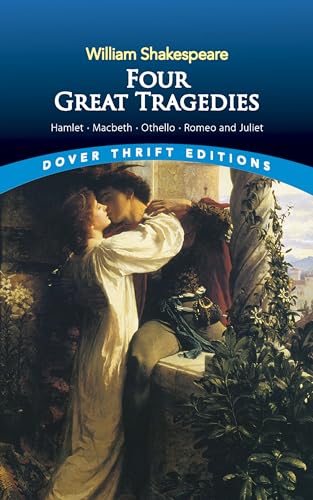Four Great Tragedies
Hamlet, Macbeth, Othello, and Romeo and Juliet (Dover Thrift Editions Plays)
William Shakespeare
BOOK REVIEW

The human experience is a tumultuous sea of passion, ambition, love, and despair - and no writer captures this chaos better than William Shakespeare in Four Great Tragedies: Hamlet, Macbeth, Othello, and Romeo and Juliet. This anthology is not merely a collection of plays; it is an explosive revelation of the complexities of the human soul, each tragedy a mirror reflecting our darkest desires and our most profound fears.
Each character springs from the page, pulsating with life and intensity. In Hamlet, we are thrust into a whirlwind of revenge and madness, where a young prince grapples with existential dread and the haunting specter of his father's ghost. As Hamlet whispers, "To be, or not to be," he echoes the struggle we all face between action and inaction, purpose and chaos. This tragedy is a potent reminder of how grief can warp our reason and how vengeance can consume the spirit whole.
Then there's Macbeth, an audacious exploration of ambition spiraling into moral decay. A noble warrior, lured by prophecies and the insidious influence of his wife, descends into tyranny and madness. Shakespeare beckons us to witness the corrosive nature of power; as Macbeth himself cries out, "Out, out brief candle!" - we feel the weight of his existential terror. His bold quest for greatness transfigures him into a tyrant filled with paranoia, and we can't help but shudder at where unchecked ambition can lead.
Enter Othello, the tragic hero blinded by jealousy and manipulated by malice. Desdemona's love paves the way for a dark journey rife with betrayal that challenges our views on race, trust, and the fragility of relationships. Shakespeare's poignant portrayal of Othello's heart-wrenching fall into jealousy serves as a chilling reminder of how easily love can turn bitter, and how pride can morph into destructive wrath. "I am not what I am," Othello declares, and in this statement lies the heart of tragedy itself - the stark contrast between our realities and our perceptions.
Finally, we unravel the passionate, youthful fervor of Romeo and Juliet, where love is such an intoxicating force that it conquers even death. Shakespeare's tale of star-crossed lovers reminds us that the most beautiful love can exist alongside the most destructive enmity. Their defiance against societal norms leads to their heartbreaking end, yet this tragedy ignites a flame of hope, urging us to cherish love in its purest form.
Readers have long been captivated by these works. Some revel in the poetic beauty of Shakespeare's language; others find themselves entangled in the emotional depth of the characters. However, not all responses are roses and sunshine. Critics argue that Shakespeare's works, while brilliant, can feel overly complex or archaic to the modern reader, forcing us to grapple with language that sometimes feels like a barrier rather than a bridge to understanding. But therein lies the challenge and the reward; peeling back the layers of his dense prose reveals humanity in its most raw and vibrant form.
The backdrop of Shakespeare's time challenges us to reconsider the weight of these tragedies. Written during the Renaissance, a period bursting with renewed passion for art and humanism, these plays not only reflect the cultural tensions of Elizabethan society but also boldly question the very essence of human nature itself. As political intrigues and social upheavals unfolded around him, Shakespeare's deep understanding of human motivations pushes us to ask: What drives us? What terrifies us? In grappling with these tragedies, we confront our own demons and ambitions.
Ultimately, Four Great Tragedies offers not just stories, but a visceral experience that taps into the very core of our existence. The exploration of jealousy, ambition, love, and madness resonates through centuries, influencing generations of artists, thinkers, and dreamers-from the profound writings of Dostoevsky to modern cinematic masterpieces. This anthology engenders a raw emotional impact, compelling readers to engage in a deeper introspection of their own lives.
Don't let these tragedies remain confined to the pages they inhabit. Dive into their depths and feel the echo of Shakespeare's brilliance pulse through your veins. Your world awaits the transformative power of these stories. Embrace the chaos, confront the darkness, and uncover the profound truths that lie within.
📖 Four Great Tragedies: Hamlet, Macbeth, Othello, and Romeo and Juliet (Dover Thrift Editions: Plays)
✍ by William Shakespeare
🧾 416 pages
2005
#four #great #tragedies #hamlet #macbeth #othello #romeo #juliet #dover #thrift #editions #plays #william #shakespeare #WilliamShakespeare